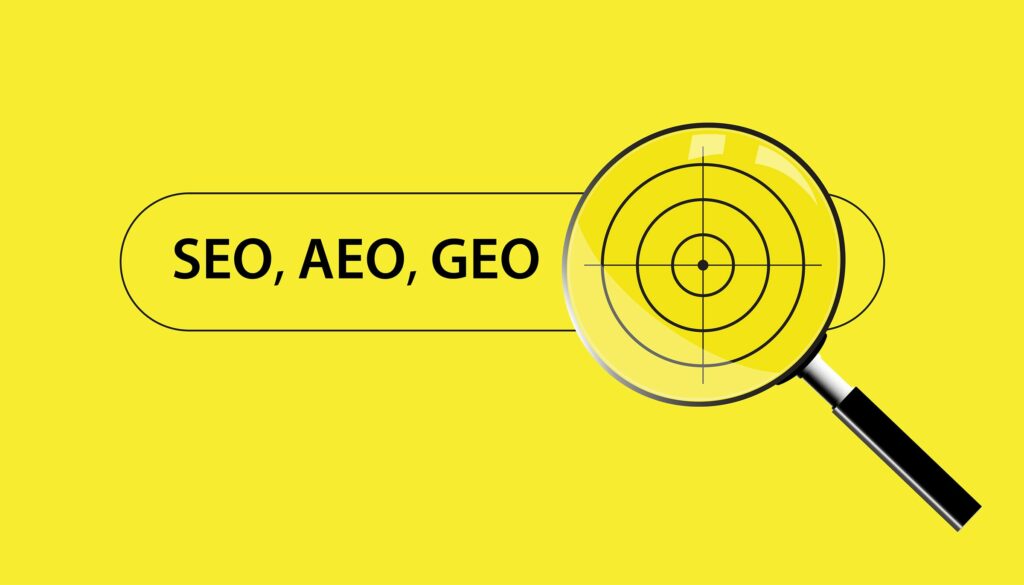The search landscape is changing fast, and it’s clear AI is at the forefront of that change. Gone are the days of just relying on traditional search engines; AI-driven search tools like ChatGPT, Perplexity and Google’s new AI-focused tools are changing how we find and interact with information.
For tech professionals and business leaders, the challenge is to stay ahead of this curve. To remain competitive, you need to understand how AI is changing search behaviour and adjust your strategies accordingly.
This blog explores the core fundamentals to succeed in AI search, looking at the similarities and differences between traditional Search Engine Optimisation (SEO) and what’s now being called AI Search Optimisation (AIO).
The Evolution of AI and SEO
For decades, SEO has been the foundation for improving website visibility. It allows businesses to drive organic traffic by optimising pages with great content, targeting keywords and enhancing user experience. But with the integration of AI technologies, user behaviour has changed.
AI-powered tools now allow users to search using natural language rather than typing a string of keywords. AI platforms summarise information from multiple sources and present users with neatly packaged answers rather than a list of search results. Efficiency is the priority, and businesses must make sure they’re included in those answers.
Why Does This Matter?
AI-driven search tools are directly impacting user purchasing decisions. Imagine this scenario reported by a business leader recently: ChatGPT recommended a list of top service providers for a project brief, and the business received direct inquiries from those businesses. It’s happening now. If businesses aren’t optimising for AI, they’ll be overlooked entirely.
AIO vs Traditional SEO
Todd Friesen, a leading voice in digital marketing, has said AIO isn’t that different from traditional SEO. The fundamentals are the same: proper coding, site speed, quality content, keyword research and link building. But small tweaks are required to adapt to the nuances of AI-powered tools.
Experts like Google’s John Mueller recommend focusing on core SEO principles, particularly brand building. The proliferation of terms like AEO (AI Engine Optimisation) and others has caused debate, but the industry agrees that the essence of optimisation remains the same.
AIO Fundamentals
To succeed in an AI-driven search environment, your strategy must go beyond the basics of traditional SEO. Here’s how:
1. Content Density and Accuracy
AI-powered search tools prioritise content that’s comprehensive, high quality and trustworthy. Your website must have depth and detail to rank higher as a trusted source.
Action Tips:
- Publish long-form blog posts, how-to guides and well-researched articles.
- Update your content regularly to reflect current trends and data.
- Focus on providing value to your audience, direct answers to their questions.
2. Structured Data Markup
AI tools rely heavily on structured data (schema markup) to interpret your content. This coding helps AI understand your website better.
Action Tips:
- Add schema markup to your site for products, services and FAQs.
- Highlight key points like reviews, events and business contact information.
3. Natural Language Optimisation
Since users are now searching in natural language, your content must match that tone. Think about how you’d answer a client’s question directly and write with that clarity and intent.
Action Tips:
- Use conversational and question based language in your headings and body copy.
- Focus on user intent; understand the common questions your audience asks and answer them clearly.
- Avoid jargon and keep your text simple and engaging.
4. FAQs and Knowledge Bases
FAQs have become essential for question-based searches. They allow AI tools to quickly identify your site as a source of information.
Action Tips:
- Build an extensive FAQ section or category-based FAQs.
- Include long tail, conversational style questions that mimic natural queries (e.g. “How does your product solve [specific problem]?”).
5. AI-Powered Website Search
Your website’s search functionality must evolve to match AI-driven expectations. Traditional keyword-based search won’t deliver the refined, conversational results users now expect.
Action Tips:
- Integrate AI-powered tools like HyperAi to enhance natural language search capabilities.
- Make sure your website delivers recommendations and resources based on intent rather than exact keywords.
Why Standardisation Matters in AIO
One of the biggest challenges with the rise of AI search is the lack of standardisation in terminology and techniques. While debates about terms like AIO, AEO and CEO continue the principles of good optimization are universal. Google’s increasing use of AI in search, as seen in tools like Gemini Search and generative AI overviews, means businesses must focus on timeless metrics like quality, helpfulness and relevance. The future of search isn’t about gaming AI algorithms; it’s about delivering top notch content that matches user intent.
What This Means for Businesses
In Action
Concepts like AI Optimisation aren’t just theoretical. AI search tools are already impacting lead generation and buying behaviour, as we saw in our earlier example of ChatGPT fueled customer inquiries. Businesses need to act now to future-proof their SEO strategies.
Internal Search Functionality Upgrade
If you have a large website or multiple subdomains consider upgrading your internal search functionality. AI-powered search functions provide a more engaging and intuitive experience for users, helping them find what they need without frustration.
Tools like HyperAi allow websites to respond to complex natural language queries, making it easier for users to access information based on their intent rather than exact matches.
The Future of AI Search is Now
Optimising for AI search tools isn’t just a recommendation; it’s a necessity to stay competitive in today’s digital landscape. Businesses that harness the power of structured optimisation, rich content and AI will be the leaders in this new world of search.
The shift from traditional keyword-based search to conversational, question-based AI tools is here and adapting to this change should be top of mind.
Looking for an AI-powered tool to boost your content strategy? Start with HyperAI today and optimise your content for the future of search.




